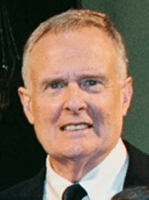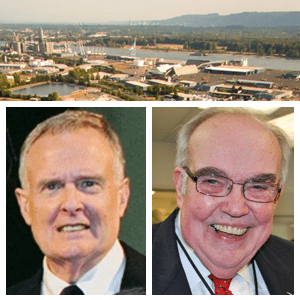Jim Luce, of Taxpayers for a Responsible Public Port, and Arch Miller, former Port of Vancouver Commissioner, offer contrasting perspectives on recent actions by the port’s Board of Commissioners
POINT Too often the port has favored business interests over the public interest, dividing our community
 By Jim Luce on behalf of Taxpayers for a Responsible Public Port (TRPP)
By Jim Luce on behalf of Taxpayers for a Responsible Public Port (TRPP)
What happens when government favors business interests over the public interest, failing to recognize that the two are mutually compatible? The answer: A political action committee forms. The Taxpayers for a Responsible Public Port (TRPP) is that committee, and our purpose is to encourage the Port of Vancouver to better balance its dual roles of acting consistent with sound business practices while serving the public interest.
Unfortunately, the port has recently failed to do this. We believe it too often favors business interests over the public interest, and in doing so doing it unnecessarily divides our community.
The current Tesoro oil project is illustrative.
When presented with a significant public safety issue prior to signing the Tesoro lease, the port bulled ahead and, as we see it, violated open public meeting law, needing a “mulligan” to correct its error.
In the process, the port ceded to the state the preliminary environmental review it should have done and refused to make significant portions of the lease public – a claim abandoned only after a year’s delay and a lawsuit.
Repeatedly asked to engage a respectful and knowledgeable public, the port’s commissioners continue to sit sphynx like.
On November 3, the voters spoke. They overwhelmingly rejected the Tesoro oil project in an election that could not have been clearer by electing Eric LaBrant, a strong Tesoro opponent endorsed by TRPP.
Elections have consequences, two of which should be (1) cancellation of the Tesoro lease and (2) repairing relationships with other local governments, especially the City of Vancouver.
We already know that Wall Street believes there is less than a 50 percent chance that Governor Inslee will approve the Vancouver Energy Project. In the current and long-term foreseeable depressed oil market, Tesoro will live or die with its “margins” in the California oil market. And the longer the project lingers, the more difficult it will be to recover from the damage already caused to the port’s reputation.
Tesoro has publicly admitted that the port can terminate the contract, and by cancelling it now, a path will be open to seek alternative tenants, including ones in clean energy. We encourage commissioners to think more for themselves, to ask hard questions and to rely less on staff. Staff understandably thinks business-first, which is their job. However, port staff isn’t accountable to voters. It is the responsibility of commissioners to balance staff’s business-first thinking with the public interest.
We also encourage commissioners to mend fences with the City of Vancouver and to work together more effectively on a waterfront project which will pay much larger and longer term community dividends than Vancouver Energy.
This, too, will need more commissioner involvement and an emphasis on policy rather than personality.
Finding the proper balance between business interest and the public interest is not easy. Views vary and reasonable people can disagree. And being a port commissioner is not easy. It is a part-time job requiring full-time attention. Commissioners must read and understand an enormous amount of information.
Our highest priority is for the port to succeed. The port is the economic engine that drives our Vancouver economy, generating millions of dollars in tenant income and supporting thousands of full-time, family-wage jobs.
TRPP will continue to closely follow port activities. We are not a “one election pony.” There is another commissioner election in 2017. We are in this for the long haul and will continue to speak out until we believe commissioners achieve a reasonable balance between sound business practices and the public interest.
Only by working cooperatively can we find the right balance.
COUNTERPOINT The port has a proven record of balancing the public’s interest with sound business practices
 By Arch Miller, commissioner at the Port of Vancouver from 1990 through 2008
By Arch Miller, commissioner at the Port of Vancouver from 1990 through 2008
During my 18 years serving as a Port of Vancouver Commissioner, there were several cases where both port staff and the commission decided against business expansion proposals when the proposed expansion did not support the policies of the port. One such example had to do with a tenant wanting to expand their facility to accommodate an increase in the volume of a lethal-to-the-touch chemical shipped through the port. Having weighed the opportunity with the risks, the commission denied the request.
Ports in the state of Washington are public entities that by statute operate in the world of private business. Consequently, ports are charged with looking out for the public’s interest (like job creation) while conducting business affairs in a manner which must adhere to and comply with a multitude of state laws and regulations in an effort to keep the public involved and informed. We did that when I was a commissioner for the Port of Vancouver, and I see nothing less in the actions of the current commission.
The action of the commission in signing a lease with Tesoro did not violate open public meeting laws. The commission followed the advice of counsel and, to date, the court has upheld their action.
By signing the lease with Tesoro, the port triggered a state law that requires the appointment of a committee to review the lease and forward its recommendations to the governor for final approval. The lease with Tesoro had to be approved by the Port of Vancouver to enable the state committee to be put into place to study the issue before making a recommendation to the governor. That process is still underway, with the Draft Environmental Impact Statement having just been released, and the earliest the process will be complete is early 2016.
The November 3 election of Eric LaBrant was to an open seat on the commission, given Commissioner Nancy Baker’s decision to not stand for re-election. This particular race in the election was not a referendum on the Tesoro Oil Project, in my opinion.
Oil is extremely important to every person living in the United States. Our country is highly dependent on oil. The automobile industry is working to reduce that dependency, but it won’t happen for many years. Consider that bicycles depend upon petroleum. Walking shoes depend upon petroleum. Sidewalks and roads depend upon petroleum. Electric cars wouldn’t run without petroleum. Toothbrushes, medical equipment and even those fancy smartphones depend upon petroleum. Even the newsprint in the paper depends upon petroleum.
The Port of Vancouver, and all other ports, handles many things we need for society that are not necessarily glamorous. However, they are part of what keeps our community, society and economy going.
Projects like the Vancouver Energy facility are not in opposition to our values for the future. Industrial jobs and blue color jobs are what made this community, and will continue to shape our community. Most jobs along the river are industrial jobs. Railroads and other private businesses invest in capital improvements to our infrastructure by having products to handle or transport. The increased focus on our commodities, such as oil, will actually improve the transportation system and infrastructure for all products moved by rail.
When balancing the public’s interest with sound business practices, the commission should be listening to as much of the public as possible. However, because a few don’t agree with a decision made by the commission, that doesn’t mean the commission isn’t listening. We’re told by some members of the public that the commission, based on those who have testified, should cancel the lease with Vancouver Energy. Yet, two statistically valid, random surveys of Clark County residents (conducted a year or so apart) show nearly 70 percent of those contacted indicated support for the project. I contend the commission has an obligation to listen to those people as well.









